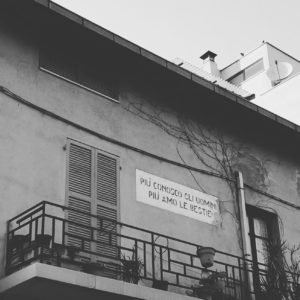Buonissimo

You live a new life, for every language you speak
Czech proverb
A friend has said to us several times, “you guys must speak a bit of so many languages”. I guess it’s true. With every move, we’ve tried to learn the lingo.
In Lusaka we were sent to Kikaonde class, to learn the local language spoken in much of the N.W Province of Zambia. The words were completely unfamiliar. Lots of things ending in a long sound “Mwane”
We travelled to the province, armed with our few phrases to get by. We tried to speak Kikaonde in the local market and we were instantly laughed at. After a few times, that quickly erodes your confidence and you give up.
In Japan, the first thing you learned were polite greetings;
ありがとうございます
Arigatou gozaimasu (thank you very much)
すみません
Sumimasen ( Excuse me, I’m sorry)
Even if we pronounced things wrongly, the people in Japan were too polite to correct you. But we were only there for months not years, and the kanji was intimidating.
Kiswahili was little different. I liked it. The first thing that you learned was “Habari” (how are you?) and “mzuri” (I’m good). I was always a little puzzled though at people saying, I’m fine and walking on. No-one ever asked back, how are you?
Some of the words were quite easy. Our school driver tried to teach me new words. On a Friday afternoon he would drop us home and say “kwisha” (finished/enough). My Kiswahili quickly morphed into nonsense, where I would string together silly sentences, messing around with my colleagues; “Habari tangewezi mutoto” was a favourite. (How are you ginger baby?)
Bahasa Indonesia was the one language that we stuck with. The international school where we worked, paid for a teacher to come to the school each week. And we could finish work an hour early, to take the class. It was a great opportunity to learn the local language.
Our classes were a little too much fun. We were not good students and we messed around a lot! Our teacher encouraged this to some extent, giving us role play scenarios, where we had to complain about something; shopkeepers and customers, hoteliers and guests. We also learned to ask things like “does your cat like to eat fish on a Tuesday?”
But our efforts paid off.
During our third year in Indonesia, we were stringing together full sentences in Bahasa Indonesia, having that ‘la la la la la’ moment where you are so chuffed. We were doing it. And then, we left.
And that’s one of the carzy things about an expat life. You invest so much, so often, to adapt. And then you move on. The words of Bahasa Indonesian that we learned, had little more than two or three years of use.
Italian has always been the exception for me. It’s the only language that came to me a little more easily. I love the sound of the words. And I’m motivated to learn.
Last year we began an online course. My husband was quick to discover the various leagues and kept checking that he was ahead of me. I continue to learn at my own pace. Every now and then the software tries to make me compete with others, with promises of promotion. I retreat, happy to be ‘mid-table’. My progress is “piano piano” (slowly, slowly) and I’m o.k with that.
Somehow new words are going into a small part of my brain that is still storing “shukrun” “habari” and “ayam gila” (crazy chicken…my nickname from a friend in Indonesia).
Again, some of what we learn will be pointless;
Quale balena – which whale?
Io sono una tartaruga – I am a turtle
It’s hoped that as we grasp more of the language, we will gain more of an insight into Italian culture. And we have so many road trips to look forward to, to test out our new vocabulary.
It’s good to be learning. I’m inspired when I look at my mother, who learned Spanish in her 70s and line dancing in her 80s. It’s easy to go through life doing the same, tried and tested stuff. Anyone can do that. But it’s far more rewarding to be thrown into the unfamiliar and be open to learning new skills.
And my favourite phrase in Italiano; ‘Fa una Bella Figura’. You can read about that in another post.
Are you learning a new language? Share a bit more and tell us your favourite phrase in that language.
© Maggie M /Mother City Time